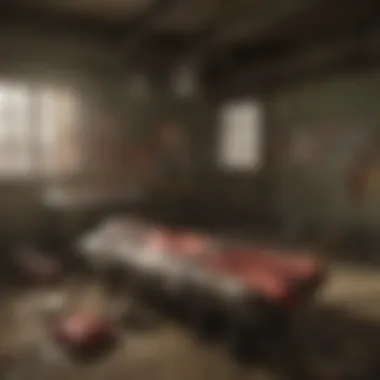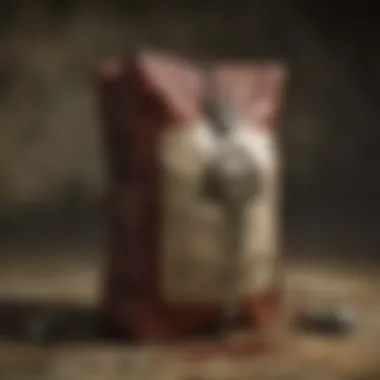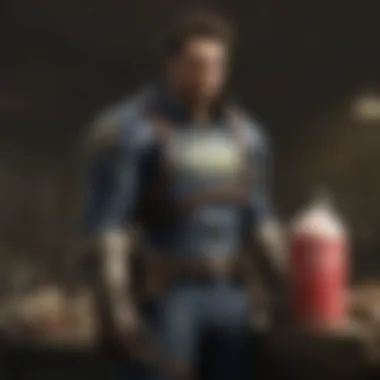The Role of Empty Blood Bags in Fallout's Storytelling


Intro
In the vast narratives of post-apocalyptic worlds, particularly within the Fallout universe, seemingly trivial items often hold significant weight. Among the debris and remnants of civilization, empty blood bags stand out not just as mere objects, but as symbols steeped in lore, survival, and human frailty. These items encapsulate the essence of the struggles in a world that has been ravaged by war, nuclear fallout, and social collapse. Their existence speaks volumes about the dire situations characters find themselves in, capturing the precarious dance between life and death that permeates the Fallout series.
As we peel back the layers surrounding these empty vessels, we unearth not only their role in gameplay mechanics but also their deeper implications for character development and world-building. By shining a light on these commonplace objects, we gain insight into the overarching themes of survival, the moral ambiguities faced by characters, and the rich lore that defines the Fallout universe.
This exploration aims to offer fans a comprehensive understanding of how empty blood bags contribute to immersive storytelling, reflecting the dichotomy of hope and despair that resonates throughout the games.
Lore Insights
Overview of the Fallout Universe
The Fallout universe is a complex tapestry woven with threads of retro-futurism and a stark depiction of humanity's downfall. It paints a harsh picture of a world where technological advances coexist with societal collapse. The remnants of the pre-war society are scattered across the landscape, with empty blood bags serving as reminders of the ahead-turned spiral of civilization. Just like a slice of a forgotten past, these bags whisper stories of medical practices long abandoned amid chaos.
Key Historical Events in the Fallout Timeline
The timeline of Fallout is punctuated with pivotal events that shaped its world:
- The Great War (2077): This nuclear apocalypse brought about the collapse of modern society, leading to scarcity of resources, including medical supplies.
- The rise of Vaults: Designed as shelters to protect some from the nuclear fallout, these Vaults also held the promise of medical care, where blood bags might have been used for transfusions and other treatments.
- Survivors' adaptations: As communities formed in the aftermath, the use of medical supplies, including blood bags, took on new meaning in the context of survival and necessity.
Deep Dive into the Backstory of Major Factions and Characters
Different factions within the Fallout series reflect divergent philosophies on survival, and blood bags often intertwine with their narratives:
- The Brotherhood of Steel: Focused on preserving technology, their medical practices might reflect a clinical approach to blood transfusions, using every drop of resource they can muster.
- Raiders: In their brutal world, empty blood bags symbolize a chilling reminder of the high costs of survival, often representing victims rather than saviors.
- Stealthy outcasts like the Courier: The journey through the Mojave and beyond is riddled with encounters where the presence of empty blood bags is a stark reminder of past battles and medical deficiencies.
"In a world stripped of its norms, the legacy of survival is written not just in grand battles, but in the remnants found in the smallest of items."
Through a closer examination of these factions, we begin to understand how these empty vessels hold not only practical implications but also deep-rooted symbolism within the storytelling framework of the series. Each character's relationship with these bags often reflects their values and decisions.
Character Dynamics with Empty Blood Bags
Beyond lore, character interactions with soft and harsh elements, such as empty blood bags, paint deeper emotional states. Consider how a character who scavenges these bags might feel the weight of despair, longing, or even the flicker of hope. As they navigate a wasteland, these objects serve as constant reminders of mortality and the necessity of resilience.
This delicate balance of survival is echoed in their choices and relationships, presenting a rich avenue for character development. In the barren landscapes of Fallout, every item tells a story, and empty blood bags are no exception.
Understanding Blood Bags in the Fallout Universe
In the chaotic tapestry of the Fallout universe, empty blood bags often appear as a simple yet telling detail within the wider narrative landscape. These bags, while frequently overlooked, serve as potent symbols of the fragmented world. Their presence emphasizes the scarcity of resources, a core theme that runs through the veins of this post-apocalyptic setting. The empty blood bags shed light on the harsh realities of survival and the struggle for vitality in a realm where identity and life itself are often sparse.
The Role of Blood Bags
Blood bags, primarily intended for transfusions, are critical items in a world ravaged by nuclear fallout. In gameplay, they represent more than mere medical supplies; they are lifelines in a desolate landscape. The bags are often used as mechanics for healing, representing an attempt to reclaim lost power and life in the player’s journey. In a game where health is a currency, a well-timed blood bag can mean the difference between life and death.
Moreover, the act of retrieving these bags from defunct hospitals or battered clinics paints a picture of desperation. When a player stumbles upon an empty blood bag, it often evokes feelings of loss and survival instinct. This scarcity resonates with the players, melding gameplay with existential themes.
Types of Blood Bags in Fallout
Within the Fallout series, a variety of blood bags exist, each with distinct characteristics that reflect the game's lore and mechanics. Here are a few notable types:
- Standard Blood Bag: Commonly found in hospitals or first aid kits, these bags provide a straightforward healing resource for players. Finding them is a signal that medical help is scarce but still somewhat available.
- Rad-X Blood Bag: A rare variation, these bags not only restore health but also offer radiation resistance. This dual function highlights the ingenuity required to survive in a radioactive wasteland.
- Surgical Blood Bag: Primarily used for more severe injuries, these bags often present a narrative tie to a specific character’s backstory or quest. Their existence and usage can initiate deeper engagement with the game’s storytelling.
Each type serves to enrich gameplay, offering players the means to explore the depths of the wasteland while emphasizing the emotional weight of each encounter.


"In the wasteland, every drop of blood tells a story, and every empty bag is a reminder of the lives that came before."
The implications of these empty blood bags stretch beyond the immediate game mechanics. They contribute to world-building and invoke empathy within players. As fans traverse the forgotten ruins of the Fallout universe, blood bags become a narrative device that connects the past to the present alive in every player's unique experience. As such, they shape the journey of survival in a world where every choice counts.
The Symbolism of Emptiness
The narrative landscape of post-apocalyptic realms brims with objects that illustrate humanity's fragility and resilience. Among such remnants are the empty blood bags, which stand as a profound metaphor for various themes, particularly survival and resource scarcity. In the context of the Fallout universe, these blood bags are more than mere items to be hoarded or discarded; they become symbols of emptiness that resonate deeply with overarching storylines and character arcs.
Emptiness as a Metaphor for Survival
Within the realm of survival narratives, the notion of emptiness carries significant weight. Blood bags, once filled with life-sustaining fluid, symbolize the desperation faced by characters who must contend with dwindling resources in a barren landscape. Their emptiness can evoke feelings of loss, signaling that hope often relies on what is no longer available. This concept resonates particularly well in Fallout, where scarcity is a constant companion in the player's journey.
- Survival Instincts: The empty blood bags echo the innate drive to endure—a reminder that survival is often about overcoming insurmountable odds. Each bag stands testament to the struggles of those who came before, managing to extract the last drops of hope from a seemingly hopeless situation.
- Resource Management: Players must grapple with the knowledge that each empty bag represents a resource that can no longer aid in healing or support. This dynamic fosters a keen sense of strategy; players learn to utilize what little they can gather effectively, turning everyday items into lifelines.
- Symbolic Emptiness: Just like a vessel that once held something essential, the empty blood bag reinforces broader survival themes within the Fallout narrative. It compels players to reflect on their own choices while navigating this harsh world. Are they hoarding resources for a potential future, or are they seeking to leverage their scant supplies for immediate needs?
Cultural and Societal Implications
The empty blood bags also carry cultural significance, reflecting societal structures that have unraveled post-catastrophe. They hint at a world that once had a semblance of normalcy, where medical supplies could be replenished and reliance on technology was taken for granted. In a fractured society, these bags remind players of what’s lost and serve as conduits for deeper reflections on humanity's downfall.
- Fractured Relationships: As societal bonds erode, characters who share a struggle against emptiness may find solidarity with one another, highlighting the importance of community in crisis. The remnants of filled blood bags could indicate past alliances that must now be redefined in a world where trust is hazardous yet invaluable.
- A Reflection on Society: The presence of empty blood bags in Fallout also invites discussions on resource allocation within societies. It raises questions about priorities during times of crisis—who gets what and at what cost? Just like in real-life scenarios, these dynamics force players to weigh their actions and their impact on both personal and communal survival.
"In wastelands where survival hangs by a thread, every empty blood bag is a chapter of lost stories, whispers of hope turned into ashes."
Gameplay Mechanics Involving Blood Bags
In the post-apocalyptic landscapes of the Fallout universe, empty blood bags are more than just leftovers from a medical procedure; they embody critical gameplay mechanics that affect the survival and strategy facets players must navigate. Just like scavengers comb through ruins for supplies, players need to understand how to efficiently utilize and manage these items to enhance their chance of survival. By examining the influence of blood bags in gameplay, it becomes clear that their significance reaches far beyond their visual presence.
Inventory Management and Strategy
When it comes to inventory management, every player of Fallout knows that space is precious. An empty blood bag, while seemingly worthless, can play a crucial part in crafting and resource management. Here’s a rundown of how they fit into the bigger picture:
- Space Optimization: Players may think of empty blood bags as junk, but they can be a boon for those setups that require strategic foresight. Choosing to keep them can free up important slots for more essential items.
- Crafting Opportunities: In certain situations, empty blood bags become vital crafting components. Recognizing this early can give players an edge in creating healing items or useful supplies before heading into perilous territories.
- Trade Value: Some characters or factions might prefer trading items that others consider useless. Finding the right person might turn these empty bags into something valuable, creating interesting barter opportunities.
"Use what others toss aside. In the wasteland, it’s the trash that often has the hidden treasure."
Players often find themselves wishing they had more blood bags when their inventory is cramped. The interesting part about managing inventory is deciding what to keep and what needs to go. This adds layers to strategizing since every wasted slot can mean missing out on crucial items during the narrative.
Healing Mechanics and Resource Scarcity
In a world where scarcity is a constant threat, blood bags serve as a reminder of the struggle for survival. Not only do players need to think about physical health, but they should also consider their resource management skills. That’s where blood bags come into play in terms of healing mechanics:
- First Aid Integration: When it comes to healing in the Fallout series, knowing how blood bags contribute to health restoration is key. Players who stockpile them can quickly use them in critical times, especially during intense skirmishes.
- Crisis Survival Tool: The ability to combine empty blood bags with other resources can lead to clever healing solutions when medical supplies are running low. Players must always think outside the box, using their surroundings and every scrap of material they come across.
- Emphasizing Choices: The limited availability of blood bags and other healing tools force players into making tough choices. This lack of resources creates engaging dilemmas that often resonate with the broader themes of survival and sacrifice.
In essence, empty blood bags resonate with more than immediately meets the eye. They create a web of strategic considerations, forcing players to blend resource management with survival tactics. Each decision regarding these bags ripples through gameplay, defining characters' journeys as they navigate a world fraught with danger.
Empty Blood Bags and Character Development
In the post-apocalyptic universe of Fallout, blood bags serve more than just their primary function in healing mechanics; they reflect and influence character development in profound ways. The presence of empty blood bags in this context speaks volumes about the harsh realities of survival, the fragile nature of humanity, and choices that players face. When embarking on a journey through the barren wastelands, players are constantly met with the stark reminder of mortality and the desperate need for survival resources. This necessity often leads to significant character choices that shape not only their path but also the essence of the characters they control.
Impact on Player Choices
The decision to prioritize healing over other essential resources creates a compelling balancing act. Players find themselves at a crossroads, where the choice to scavenge for blood bags becomes a matter of life and death. The emptiness of these bags can symbolize missed opportunities or the harsh consequences of resource mismanagement. Players might choose to hoard blood bags, but in doing so, they must forgo other valuable items like ammunition or food. This juggling act illustrates the broader theme of scarcity in the wasteland, providing a direct reflection on player strategy.
Moreover, the emotional weight of these empty bags can enhance immersion. When players realize that an empty blood bag could’ve meant survival for a fellow wasteland wanderer, it hits home on a deeper level. The idea that mere objects can influence moral decisions and leadership styles forms a unique narrative thread driving deeper emotional connections within the gameplay.


"In a world devoid of hope, the choices we make are shaped by the resources we gather and the lives we save—or don't save."
Narrative Devices and Player Agency
The empty blood bags also serve as narrative devices that emphasize player agency. Each bag can be seen as a reminder of personal failures or triumphs in the game's story arc. Players often feel the weight of their choices through these items—whether to use them, trade them, or even discard them equates to stating their priorities in a world riddled with chaos.
In certain quests or missions, the decision to choose between giving away or utilizing a blood bag can affect future interactions with NPCs. For instance, a character who selflessly gives out blood bags may be more respected or trusted, weaving a thread of camaraderie or rivalry that further develops the game's narrative.
Additionally, the presence of blood bags in dilapidated hospitals or makeshift clinics highlights the remnants of civilization's attempts to preserve life. This placing encourages reflection on what it means to be human in desperate times, creating a rich tapestry that players can explore as they encounter these items. Thus, empty blood bags offer valuable insights into how characters evolve not only through the gameplay but through the narrative inspired by their decisions.
The Role of Medical Supplies in Post-Apocalyptic Settings
In the desolate landscapes of post-apocalyptic settings, where survival often hangs by a thread, medical supplies take on a significance that far exceeds their mundane purpose. The mere presence of items like empty blood bags reveals layers of urgency, desperation, and necessity that echo through the narrative. These supplies become lifelines for characters trying to navigate a world shattered by chaos. The emptiness of a blood bag symbolizes not just a lack of resources but also the dire straits of the characters who rely on them.
Importance of Medical Resources
Medical resources serve as a cornerstone for survival in these environments, fulfilling various roles:
- Life-Saving Functionality: In desperate conditions, the ability to patch wounds, stave off infections, and treat illnesses can mean the difference between life and death.
- Psychological Crutch: When players or characters hoard these supplies, it can create a false sense of security, even if they know that scarcity is lurking just around the corner. It's a common trick of the mind to cling to any semblance of hope.
- Strategic Gameplay Elements: Inventory management intertwines with medical resources, forcing players to make tough choices. Do they carry more ammo or hold onto that crucial medkit?
As such, their presence—especially when they run low—can alter the flow of the game. The emotional weight carried by medical supplies often spills into the player's decisions, adding depth to gameplay that goes beyond mere mechanics.
Resource Gathering and Management
Resource gathering is not just about scavenging; it embodies the essence of surviving in a world upended. Collecting medical supplies demands a keen eye and strategic planning:
- Scavenging Locations: Players must venture into treacherous areas. Abandoned hospitals, precarious military outposts, and long-forgotten pharmacies become hunting grounds where danger mingles with opportunity.
- Inventory Limitations: Most games impose strict limits on how much can be carried, challenging players to prioritize what they bring back. Players weigh the necessity of a blood bag against other important items—this is where strategy comes into play.
- Crafting and Combining: In many narratives, players can combine items to create more advanced medical supplies. This crafting system offers players a chance to customize their approach, from a simple bandage to a more sophisticated healing solution.
"In the wasteland, every empty blood bag carries the weight of an untold story—a reminder of what could have been and what still might be."
Managing resources effectively not only impacts survival but also weaves a richer narrative experience, highlighting how players deal with the haunting memories of what was, alongside the grim reality of what is.
Fan Theories and Speculations
In the realm of post-apocalyptic narratives, particularly in the context of the Fallout series, fan theories and speculations about empty blood bags hold significant weight. They not only enhance the gaming experience but also deepen our understanding of the game's universe. Gamers frequently bond over their interpretations, which can lead to richer, more immersive gameplay. When players engage with elements like blood bags, they're not just passively consuming content; they're actively participating in the storytelling process.
Analyzing Community Discussions
Online forums and social media platforms buzz with discussions regarding the role of empty blood bags. Reddit threads often explode with theories about why these items are left behind. Some speculate they reflect a world where medical supplies have become precious resources, left as remnants of a life that once was.
"Empty blood bags symbolize the fragility of life and the harsh reality of loss in a survival setting. They remind players that in this wasteland, every resource counts but also signifies what we’ve lost."
Others delve into the potential for hidden narratives within these bags, questioning if they ever contained the blood of pivotal characters or even the players themselves. This can lead to a sense of interconnectedness in the game's lore, fostering discussions on character importance and legacy. Analyzing these discussions can shed light on how players interpret the environment and events of the game—not just as players, but as part of a larger community experience.
Connecting Lore with Gameplay
The link between lore and gameplay in Fallout is profound. Empty blood bags serve as visual reminders of a broken world, reinforcing the fragility of the setting in-game. Players often find themselves reflecting on the significance of these bags as they navigate their journeys through the post-apocalyptic landscape. The mechanics of using blood bags for health may seem straightforward, but when examined closely, they evoke deeper conversations about survival, humanity, and morality in dire times.
- Gameplay Mechanics: Players often strategize on how to use their medical supplies effectively. Discussions about the balance of resources—deciding when to use blood bags—underscore the seriousness of survival.
- Lore Implications: The origin of these blood bags and the events leading to their emptiness can tie back into quests and character backstories, which enriches the narrative.
Through engaging with the community's insights, players cultivate a more profound understanding of the implications of each empty blood bag. They act as a bridge between the silent stories of the wasteland and the active decisions that shape a survivor's fate. Thus, the importance lies not just in their physical presence but in their ability to spark thought-provoking discussions about what they represent in the grand scheme of the Fallout universe.
Comparative Analysis with Other Games


When we think about survival themes in gaming, the landscapes filled with haunting echoes of the past often echo the innate human struggle for sustenance and safety. One striking aspect of this struggle is presented through the use of blood bags, particularly in post-apocalyptic narratives. Understanding this element’s significance within the Fallout franchise leads us to explore its presence in other gaming environments, where survival horror reigns supreme.
Blood Bags in Survival Horror Games
In survival horror games like Resident Evil or Silent Hill, blood bags serve not only as a gameplay mechanic but as a compelling storytelling device. They can evoke a sense of vulnerability as players confront the grim realities of their characters' fates. For instance, in Resident Evil 2, blood bags found in the wreckage of a lab imply desperation and a fight against the undead plague. Gamers become acutely aware that these bags could mean life or death, pushing them to scavenge for resources with the tenacity of a cornered animal.
Moreover, the choice of whether to use a blood bag or save it for another day can weigh heavily on the player's conscience. Players navigate these moral dilemmas, which creates a rich tapestry of tension and anticipation. Thus, blood bags act as a metaphor for the struggle against despair, with every life-sustaining sip feeling like a tiny victory amid a world teetering on the brink of collapse.
Symbolism Across Different Franchises
Across the board in gaming, the symbolism tied to blood bags stretches far beyond their practical implications. In The Last of Us, for example, blood becomes a symbol of life itself, often intertwining with themes of sacrifice and the desperate lengths to which individuals will go to protect their loved ones. The emotional weight of blood currents through the narrative, ensuring players feel the implications of every drop.
Similarly in Dead Space, blood bags evoke the horror of bodily autonomy being stripped away. The grotesque might of the necromorph creatures reshapes the notion of life and death, leading to a chilling narrative about the fragility of existence. Here, the blood bags become vestiges of a scientific endeavor gone horrifically wrong, reflecting the universal anxieties of our own reality—what happens when human experimentation dehumanizes us?
Through these comparisons, we see that blood bags are far from mere tools in gameplay. They are imbued with profound meanings that resonate deeply with players. In many franchises, those bags encapsulate the essence of survival and the ever-looming specter of mortality.
"In the vast universe of survival horror, every drop of blood tells a story, and every empty bag bears witness to the fragility of life."
By analyzing how blood bags function within various survival horror narratives, players gain a heightened appreciation of their role in Fallout—not only as resources but also as powerful symbols threading through the fabric of human experience in desolation. This introspective approach fosters an understanding that transcends individual games, showcasing how elements familiar to one franchise can enrich others.
The Future of Blood Bags in Gaming
The landscape of gaming continually evolves, and as we look to the future, blood bags are poised for a significant transformation within this medium. What might seem like a trivial aspect of post-apocalyptic narratives actually holds potential for deeper gameplay mechanics and storytelling techniques. This importance isn't just in mechanics but also how they can affect emotional engagement, resource management, and lore integration across various titles. Recognizing the complexities surrounding the use of blood bags opens avenues for innovative designs that resonate with players.
Potential Developments in Game Design
Looking ahead, the role of blood bags can be enhanced through various developments in game design. Here are a few possible avenues to explore:
- Dynamic Resource Management: Rather than being mere collectible items, blood bags could become part of a dynamic system where players must ensure they have a steady supply. For instance, just like food or water in survival games, running out of blood bags could affect a character's health or abilities. This would add layers of strategy, compelling players to prioritize medical resource acquisition in their gameplay.
- Interactive Crafting Mechanics: Future installments could introduce crafting systems that utilize blood bags. Players might blend them with other items to create unique healing items or weapons. Imagine a scenario where empty blood bags could be combined with chemicals found throughout the wasteland to produce serums granting temporary boosts.
- Evolving Narrative Elements: Game designers might leverage blood bags in creating branching narratives. The presence or absence of these items could influence dialogue choices or the story arc. For example, a character may refuse to ally with someone without adequate medical supplies, forcing players to weigh the importance of these items when forming alliances.
These developments not only bring a fresh perspective but also intertwine the mechanics with the storytelling of the game. Including blood bags in this way could help players feel more embedded in the world around them, making every choice carry weight.
Implications for Immersive Storytelling
The future of blood bags in gaming also has substantial implications for immersive storytelling. This is not just about the mechanics; it’s how they function within a narrative framework:
- Heightened Emotional Engagement: By making blood bags more integral to the storyline, developers can evoke stronger emotions. For example, imagine a desperate situation where a character sacrifices their own well-being to save a loved one by administering a blood bag. Such moments can resonate deeply with players, fueling empathy and investment in character relationships.
- Exploration of New Themes: Emptiness of blood bags could symbolize larger themes—like loss, sacrifice, or the consequences of survival. A game could weave a narrative exploring the moral dilemmas that arise when survival becomes a priority over compassion. This creates not just a gaming experience, but also a thought-provoking commentary on human nature in dire circumstances.
- Incorporating Player Choices: Given the importance of player agency in modern gaming, the role of blood bags can influence gameplay. Players could face decisions about when to use or give away these items, prompting reflections on their values and priorities. A system where choices lead to different outcomes can significantly enhance replayability and emotional resonance.
"As the sun sets behind the wasteland, and the shadows grow longer, the empty blood bag becomes more than just trash—it's a reminder of what has been lost and what has yet to be fought for."
In summary, as the gaming industry pushes forward, the potential for blood bags to morph from passive elements into dynamic, multi-faceted components of gameplay and storytelling is profound. Game developers can utilize them to deepen emotional connections, challenge player decisions, and enhance overall narrative complexity. This nuance offers an exciting realm of possibilities that could redefine how players interact with not only the blood bags but the entire immersive experience of the game.
The End
The exploration of empty blood bags within the post-apocalyptic settings of the Fallout universe reveals significant insights into both gameplay mechanics and narrative depth. Blood bags serve not merely as game elements but as symbols that resonate with deeper themes of survival and human fragility. The emptiness represented by these bags underscores a world where resources are scarce and hope can fade away just as easily as life itself.
Recap of Key Insights
Throughout the article, we have examined several key aspects regarding the significance of empty blood bags, including:
- Survival Mechanics: The strategic element of managing medical supplies in environments fraught with danger.
- Character Development: How players' choices related to blood bags can shape their journey and the fate of characters in the Fallout series.
- Symbolism: The metaphorical implications of emptiness in a world that has been stripped of its former vibrance, reflecting the survival struggle of both characters and players.
- Resource Scarcity: The critical role that every item, even those that seem inconsequential, plays in the overarching narrative of survival.
These points highlight the intricate relationship between the gameplay experience and the thematic narratives at play, affirming the relevance of even the most basic of items in crafting engaging stories.
Final Thoughts on Emptiness and Survival
In a post-apocalyptic landscape, empty blood bags embody more than just vacuous vessels; they serve as poignant reminders of the stakes involved in survival. The presence of an empty blood bag can evoke feelings of despair, loss, and, at times, the profound weight of decisions imposed on the player. They remind us that resources, be they physical or emotional, are finite.
The interweaving of such symbols within the gameplay not only enhances immersion but also elevates storytelling to greater heights. As players navigate the wasteland, they confront not only external threats but also the internal struggles mirrored in the emptiness of these bags. This connection illustrates the complex narrative layers that the Fallout franchise is celebrated for, enriching the experience and drawing players deeper into its world.
"In the wasteland, emptiness reflects our greatest fears and hopes, marking each step taken with a solemn reminder of what it means to survive."







